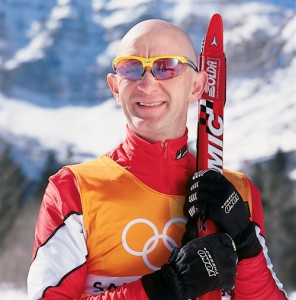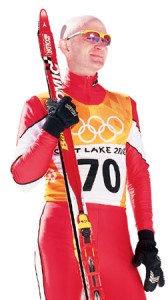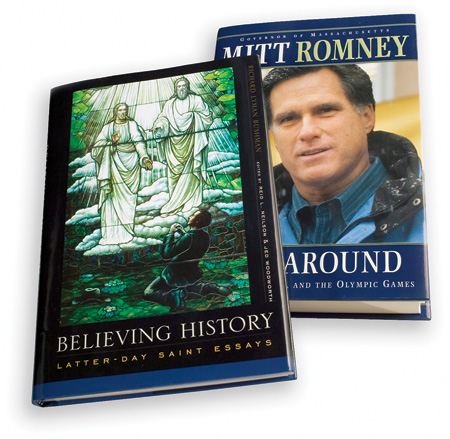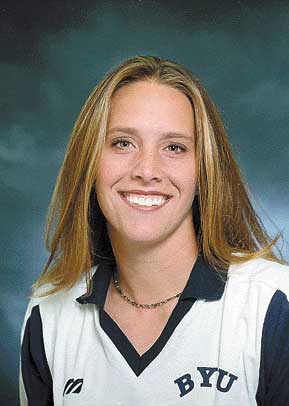
Paul O’Connor did not win an Olympic medal but his participation in the Games inspired spectators and competitors alike.
By Michael R. Walker, ‘90
HE shares a birthday with Pierre de Coubertin, renowned father of the modern Olympics. But a year ago if anyone had mentioned the term Olympic spirit to Paul O’Connor, ’94, he would likely have responded with a cynical chuckle. And after skiing in the 2002 Olympic Winter Games in Salt Lake City, he could have easily remained skeptical. He finished 69th in a field of 72.
But after participating in the Games, O’Connor’s cynicism has vanished—there is no stronger convert to the Olympic ideal.
“I have had too many spiritually uplifting experiences in connection with these Games to be otherwise. I have seen competitors, coaches, and volunteers express all that is good in the human spirit. I have seen athletes overcome apparently insurmountable odds. These Olympic Games were a testimony to me of the greatness of the human spirit,” says O’Connor.
O’Connor wasn’t first across the finish line in the 1500-meter cross-country race. But he finished. And O’Connor is now and will always be an Olympian, having qualified for and competed in one of the highest levels of sport. He is also a part of Olympic history—the first Irish athlete to compete in cross-country skiing at an Olympics.
Much of the Olympic focus is on winners, but of the 78 nations represented in Salt Lake City, more than 50 went home without a single medal. And there is something inspiring about athletes who realize they cannot win yet remain determined to complete their race.
“Numerous people told me how inspired they felt by my participation,” says O’Connor. “They were inspired because, frankly, I’m just a regular Joe, not a full-time professional athlete.”
Equally inspiring is O’Connor’s premeditated selflessness. “Months before the Games I had consciously decided that I would not have a selfish focus but would look for opportunities to help other competitors. The way opened up to me to do so, and there were a number of athletes I was able to help significantly—before, during, and after the Games.”
For example, O’Connor sensed that another Olympian was going to have extreme difficulty in a race, so he found a way to help. “I was waiting for him on the lonely top of the most gruelling uphill ascent, far from the shouting crowds. Our eyes met as he passed. No words were needed. He knew I was there for him.”
What meaning can be found in finishing nearly last? O’Connor shares his perspective. “I learned that the Olympic Games are not all about winning. I know I can hold my head high because I helped others succeed.”
AN IRISH SKIING TALE
Irish skier Paul O’Connor shares his experiences in the 2002 Olympic Winter Games in Salt Lake City. “The most important thing in the Olympic Games is not to win but to take part, just as the most important thing in life is not the triumph but the struggle. The essential thing is not to have conquered but to have fought well.”
“The most important thing in the Olympic Games is not to win but to take part, just as the most important thing in life is not the triumph but the struggle. The essential thing is not to have conquered but to have fought well.”
—Pierre de Coubertin
I have always enjoyed the fact that Pierre de Coubertin and I share the same birth date—Jan. 1. (Coubertin is the French gentleman who was largely responsible for the resurgence of the modern Olympic Games.)
Inspiration
I served a full-time mission in the England Coventry Mission. President Quinn G. McKay, ’54, was one of the biggest influences in my life. He taught me about integrity and being your best.
Watching movies was not allowed in our mission, however on one occasion President McKay shocked us by announcing that those who met a certain criteria could go see the movie Chariots of Fire—the very inspiring story of the British team at the Paris Olympics of 1924. So my companion and I viewed the movie. Ever since then, Isaiah 40:28-31 has been one of my favorite scriptures: “Hast thou not heard. . . . they that wait upon the Lord shall renew their strength; they shall mount up with wings as eagles; they shall run, and not be weary.”
Those verses have carried me through many challenges this past year. Choosing to not race on Sundays presented some challenges that made it more difficult for me to qualify, but I have never considered it a handicap.
Becoming an Olympian
I attempted to participate in the Olympic Games in Albertville, France, in 1992. I was a “classical” skier back then and had even constructed my own primitive version of a NordicTrack for summertime training! The thought of competing in the Olympics was a dream to me. As a kid growing up in Ireland, I was inspired by the Summer Olympics, especially the distance runners. I reveled in the legends of Pietri Dorando, Roger Bannister, Paavo Nurmi, Zatopek, and others.
The IOC in April 1988 responded to my application and passed me on to the Albertville Organizing Committee, who in turn passed me on to the Olympic Committee of Ireland. My efforts to compete in both Albertville (1992) and Lillehammer (1994) failed. I was ultimately informed that Ireland had arbitrarily decided to not be represented in nordic skiing. I was devastated and thought that at age 33 my chances had slipped away.
In the intervening years I have always kept that notification and have frequently read it and reread it and sighed as I contemplated “what might have been.” Well, in light of Salt Lake 2002, what was once a letter of sore rejection has now transformed into a beautiful thread in the tapestry of my Olympic dream. Never give up on your dreams.
Persistence
While I was in Canada last year for a qualification race, I was feeling really worn out like my body could no longer withstand the intense training. I confided in an athlete friend, Isaac Menyoli. I will never forget his animated face and the words he spoke in response: “Paul man, you can’t give up. You have to qualify! Look at me, I’m from Africa!”
I will never forget that. He made me laugh at a time when I did not feel like laughing. He is a big, tall, strong athlete and has been training back east for a number of years, but what he was saying was something to this effect: “I didn’t even know what snow was until a few years ago. If I can do it, you can do it!”
New York
Immediately after the bombing of the World Trade Center, my initial thinking was that athletes could be possible targets, so I was extremely apprehensive about being a part of the Games at all. However, as I read the countless inspiring stories of selflessness and heroism, I realized—like many others—that this was not a time to shy away in a corner, but a time for the world to stand tall and together. I felt strongly that Ireland needed to take its place among the nations and, in doing so, honor this great country. And if little old me was the only chance to have the green, white, and gold waving at Soldier Hollow, then I was going to do whatever it took to be there.
Qualifying
One of my qualification races was a grueling 30 kilometer marathon. It was a very tough course and the weather that day was stormy. In fact many of the top racers in the world dropped out. At one point the race organizers were literally telling athletes that they did not have to finish the race. “Do you have to finish the race?” shouted one of the race directors to me through the wind, as I finished the second of three laps. The truth is I was physically and emotionally spent; I had nothing more to give. Fortunately for me I remembered New York, and I had a burning ambition within. I looked him straight in the eye and said slowly: “Yes, I do.”
There are no words in the English language to describe those lonely final 10 kilometers. But I learned this: when the human spirit is at its absolute extremity, it can either fall or rise in greatness. That to me is what the Olympic spirit is all about.
Race Day
Despite all my training, I made some mental errors before the race that resulted in a sub-par performance—my skis were slow, my body was cold, etc. I knew I could have done significantly better, so as an athlete I had to deal with those very difficult emotions the day after the race. As I struggled to find meaning in my performance (I finished fourth from last, 69th in a field of 72 in the 1500 meter), I felt the need to pray about it.
And the answer came to me powerfully over the ensuing 24 hours as I met some special Olympic friends. Let me explain.
One advantage of having a testimony of the gospel is that it helps us put things in perspective. So, months before the Games, I had consciously decided that I would not have a selfish focus but would look for opportunities to help other competitors. The way opened up to me to do so, and there were a number of athletes I was able to help significantly—before, during, and after the Games. None are members of the Church, and they did not win any gold medals. But they are men of character who are true champions in my mind. And each one of them now considers me a true friend.
For example, one such experience was with a young friend from another nation. On the outside he was confident and tough as nails, but I knew he would have extreme difficulty in his particular race, so I was waiting for him on the lonely top of the most grueling uphill ascent, far from the shouting crowds. Our eyes met as he passed. No words were needed. He knew I was there for him. We visited in his wax cabin immediately after the race. He lay on the floor like a worn-out rug—physically and emotionally exhausted. People don’t realize how extremely demanding nordic ski racing can be. My friend was in tears; he sobbed like a little child for a long time as he sought to recover from the ordeal he had just been through. He was now an Olympian. He cried tears of both pain and joy. And I cried with him.
I had many such touching personal experiences which I shall treasure forever. No, I did not win a gold medal, but I learned that the Olympic Games is not all about winning. I know I can hold my head high because I helped others succeed.
Beyond the Race
The day of my race, I left the Olympic Village to attend “New Beginnings,” an important event for my daughter. Some people thought I was unwise to divide my attention during the Games, but in my opinion it’s like that Church poster says, “Some things are nice, but some things are important.”
A day and a half before my race I also left the Olympic Village to check on my home-teaching families. The visits were brief, but they got the message; they knew I loved them.
The Handkerchief
A few people have asked me about the white handkerchief I waved to my family and friends right before the race. It’s very personal, but here’s a quick summary. I had close friends in my race from around the globe, literally—from Africa, Asia, Europe and the Americas. The handkerchief was my way of tying us together. The handkerchief began in North Africa, it traveled throughout Asia and Europe during the second world war, and ended up in Paris where my mother and step father met and lived. It was given to me after my step father’s death. I loved him dearly. Since then it has been to some of the most sacred places to me on this continent, including the dedication of the Palmyra and Winter Quarters temples. And now it has been to the 2002 Olympic Games in Salt Lake City. I carried it during the race. To anyone else it is just a handkerchief, but to me it is very special. I guess it is because I am Irish; Irish people remember the past.
Spreading Irish Culture
One of my more experienced Irish teammates, Paul Schwarzacher-Joyce, told me that at the Olympic Games being an ambassador for your country may be as important as the athletic events themselves. So I gave some concerts—instrumental Celtic music—at a few venues in the Olympic Village.
Olympic Museum
As the first Irishman in the history of the Olympic Games to qualify to compete in any nordic skiing event, I was invited to donate some article of equipment to the Olympic Museum in Lausanne, Switzerland. I gave them my race gloves. What an honor.
Royal Breakfast
I met many interesting people during the Games. For example, I used to eat often with the Jamaican bobsled team. One morning this nice guy joined us for breakfast and we struck up a conversation. Later I discovered it was Prince Albert of Monaco!
Closing Ceremonies
The closing ceremonies were held on Sunday, Feb. 24. While that was a memorable event in my life—the extinguishing of the torch, saying goodbye to friends, etc.—it wasn’t the most important thing that happened that day. That morning I made my way through security out of the Olympic Village to attend sacrament meeting at a local ward. As far as I am concerned, that—partaking of the sacrament—was the most significant event on Feb. 24, 2002.









